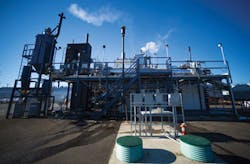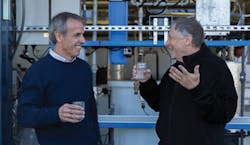Bill Gates, Peter Janicki and the Omni Processor--A Game-changer for Reuse in Africa?
Bill Gates recently caused a media storm by drinking reused wastewater. Although not a new concept to the industry, one US company is taking a scaled down version of the technology to Dakar, Senegal. Converting waste into energy, fertiliser and much-needed water – could this technology be an off-the-grid answer to the developing world's challenges?
By Jeremy Josephs
Half of the world's wealth will be owned by just 1% of the population by next year, as global inequality soars, according to a report from Oxfam. It's a visual contradiction, then, that billionaires and world leaders recently gathered in the stylish Swiss ski resort of Davos.
Meeting for the World Economic Forum, over 1700 private jets clogged the skies, causing a logistical nightmare for those tasked with ensuring orderly take-off and landing slots. The Davos summit happened to be co-chaired by Oxfam's executive director, Winnie Byanyima, who was seen to be rubbing shoulders with richest-man-in-the-world Bill Gates. And it's Gates who has not only been putting his money where his mouth is - but also actually drinking the waste-turned-to-water results.
Wastewater goes viral
It's not often that a video about wastewater treatment goes viral. But that is precisely what happened when Bill Gates posted a two-minute clip on YouTube about the Omni Processor - prototype built by Sedro-Woolley, Washington-based Janicki Bioenergy (but funded by the Gates Foundation) and which converts human waste into water and electricity.
For before you could say Windows 10 almost three million people had watched the Omni Processor at work - as it set about using boilers, steam power and a filtration process to ingest human faeces and output clean drinking water, electricity and a small amount of ash waste.
"I watched the piles of faeces go up the conveyor belt and drop into a large bin", Gates wrote in his accompanying post, "they made their way through the machine, getting boiled and treated. A few minutes later I took a long taste of the end result - a glass of delicious drinking water which tasted as good as any I've had out of a bottle."
Each plant costs roughly $1.5 million and can process wastewater for a community of approximately 100,000 people. The system includes a steam power plant, an incinerator and a water filtration system.
"The trick is that these things feed off each other, in sometimes recursive ways", CEO Peter Janicki tells WWi magazine. "The first thing I did was the thermodynamics. It's a little like an accountant looking through things and saying 'do we have enough money to make this thing work'? I did the same thing looking at the energy and was pleasantly surprised early on that it looked like this could work. And once I figured that out, it was just a matter of dealing with the details."
As for Janicki himself, he grew up participating in his family's successful logging business, before going on to earn his Masters in Mechanical Engineering from the University of Washington. When he founded Janicki Machine Design back in 1993 the intention was to develop, produce and sell sophisticated computer-driven precision milling machines.
Proving reliability
Today, Janicki has big ambitions for the Omni Processor technology: "The reaction has been overwhelmingly supportive and worldwide since that video went online," he says. "Literally hundreds of requests have come in from governments and companies looking to use the Omni Processor as part of their sanitation solution.
"We can hardly keep up. In fact the prototype is now complete and we are in the process of shipping one to Dakar, Senegal right now. It will be employed at a wastewater treatment plant for the next several years. This will help prove our ability to operate under harsh conditions, with high reliability."
He anticipates calm after the current media, storm, however: "Of course the current fuss about us will die down and rightly so. For it is the marketplace that will be the ultimate judge. But it is my firm view that when entrepreneurs are making money, then the Omni Processor will spread fast. Banks will want to finance them, governments will support their installation, and many companies will partner with us when it comes to distribution, support and manufacturing."
Call it a coincidence if you will but the Bill & Melinda Gates Foundation happens to be situated just 70 miles to the south in Seattle. It has an entire arm (headed up by Brian Arbogast) dedicated to water, sanitation and hygiene. Its goal? "To enable universal access to sustainable sanitation services by supporting the development of radically new sanitation technologies as well as markets for new sanitation products and services."
Arbogast says: "Improved sanitation - including waste treatment and resource recover - are essential to a healthy and sustainable future for the developing world. That is why our Foundation focuses on groundbreaking innovations in sanitation technology and new ways to deliver sanitation products and services, particularly in densely populated areas of South Asia and Sub-Saharan Africa.
"That is why we are backing the Omni Processor. Ideally, processed waste will be converted into products, forms of energy, or fertilisers and other soil amendments, which can generate revenue and thereby offset waste collection costs and increase people's standard of living."
Simplifying solid solutions
Born in Côte d'Ivoire, Dr Doulaye Koné is senior program officer at the Gates Foundation but used to work for the African Water Association (AfWA) as Program Coordinator Africa Water Operators Partnerships' (WOP-Africa).
With a PhD and MAS in sanitary and environmental engineering, he is well aware that there needs to be fresh thinking when it comes to infrastructure.
"The sanitation system as we know it in the developed world just cannot work in developing countries", he says. "What we need in developing countries is a very simple system. That is why I am confident that the Omni Processor fits the bill."
Mark van Loosdrecht, a professor of environmental biotechnology at the Delft University of Technology in the Netherlands, who has studied wastewater treatment for over a quarter of a century, says that it could well be the case that the Omni Processor will be as efficient as Janicki and Gates claim.
"Of course only time will tell if it will indeed work as advertised," he says, adding a note of caution amongst the extensive media hype. "But I have to say that I do applaud the Foundation for working to move sanitation research in new directions. It gives the developers certainty that if they improve, then they don't need to worry about support. And personally I very much like the long-term vision instead of the usual program with short-term gains."
Practical partnership
Janicki expects many "different models, over time, to fit into different segments of the marketplace". He says that making the processor profitable will require a mechanism to fund the deployment around the world. "It is possible to charge a tipping fee for the sludge, and sell only the electricity, and have a profitable business," he adds.
"However, because the volume is so large, selling water even at a reduced fee makes the business quite lucrative. The distributive nature of the processor is a key element. There is a lot of clean water in the world. It is just not where people need it. Trucking the sludge far away from people is not affordable. Because the processor takes very little land, it can be located where there are high concentrations of people who need sludge destroyed and clean water provided. So there are so many exciting opportunities to come. And we are doing some good in the world in the process. It's difficult to express just how satisfying that can be."
The Gates Foundation's focus is firmly set on practical and pragmatic solutions. So Janicki's engineering, backed by Gates' money, appears to be a match made in sanitation heaven. With the media storm winding down, the proof of the technology's success will now be down to its performance in Senegal. If successful, it could certainly be a topic of conversation at the next World Economic Forum.
*************
Nuts 'n' Bolts: How the Omni Processor works
A steam engine generates heat for a dryer, which accepts the raw sewage and dries it out. Boiling then separates the solids from the water. An incinerator burns the dried-out solids. This in turn produces high-pressure steam that helps drive the steam engine and, through a generator, makes electricity that can power the Omni Processor.
The process then repeats while, simultaneously, water vapour produced by the sludge dryer travels through a cyclone to spin out any entrained particles, and then other filters - a coarse filter and fine half-micron membrane filter that resembles Gore-Tex fabric - remove additional substances. Next comes the condenser that turns the vapour back into water, which is aerated and passes through multiple activated charcoal filters.
Jeremy Josephs is a freelance contributor for WWi magazine. For more information on the article, email: [email protected].
More Water & WasteWater International Archives Issue Articles





